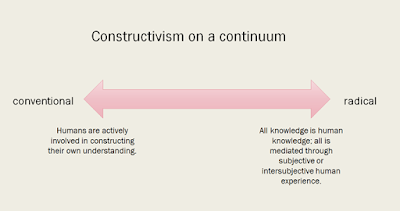Radical Constructivism
Radical
Constructivism
 Constructivism is
an approach to learning that argues that learners will not understand knowledge
if they are simply taught facts as pre-existing entities. Elliott et al.(2000) define
constructivism as ‘an approach to learning that holds that people actively
construct or make their own knowledge and that reality is determined by the
experiences of the learner’ (p. 256). Rather, each
learner must not only come to knowledge on his or her own terms; he or she must
actually create the knowledge from scratch. Every learner constructs a
knowledge base that he or she then builds on as part of moving through the
world. Constructivism's
central idea is that human learning is constructed, that learners build new
knowledge upon the foundation of previous learning.
Constructivism is
an approach to learning that argues that learners will not understand knowledge
if they are simply taught facts as pre-existing entities. Elliott et al.(2000) define
constructivism as ‘an approach to learning that holds that people actively
construct or make their own knowledge and that reality is determined by the
experiences of the learner’ (p. 256). Rather, each
learner must not only come to knowledge on his or her own terms; he or she must
actually create the knowledge from scratch. Every learner constructs a
knowledge base that he or she then builds on as part of moving through the
world. Constructivism's
central idea is that human learning is constructed, that learners build new
knowledge upon the foundation of previous learning.
 Constructivism is
an approach to learning that argues that learners will not understand knowledge
if they are simply taught facts as pre-existing entities. Elliott et al.(2000) define
constructivism as ‘an approach to learning that holds that people actively
construct or make their own knowledge and that reality is determined by the
experiences of the learner’ (p. 256). Rather, each
learner must not only come to knowledge on his or her own terms; he or she must
actually create the knowledge from scratch. Every learner constructs a
knowledge base that he or she then builds on as part of moving through the
world. Constructivism's
central idea is that human learning is constructed, that learners build new
knowledge upon the foundation of previous learning.
Constructivism is
an approach to learning that argues that learners will not understand knowledge
if they are simply taught facts as pre-existing entities. Elliott et al.(2000) define
constructivism as ‘an approach to learning that holds that people actively
construct or make their own knowledge and that reality is determined by the
experiences of the learner’ (p. 256). Rather, each
learner must not only come to knowledge on his or her own terms; he or she must
actually create the knowledge from scratch. Every learner constructs a
knowledge base that he or she then builds on as part of moving through the
world. Constructivism's
central idea is that human learning is constructed, that learners build new
knowledge upon the foundation of previous learning.
This prior knowledge influences what new or modified
knowledge an individual will construct from new learning experiences (Phillips,
1995).
Kant’s studies on the integration of rationalism and
empiricism indicate kind of constructivism. In his opinion, the subject can not
open toward the external world directly. Only by the constructed-internally
principal cognitive rules, the subject can organize experiences and develop
knowledge. Kant held that our mind does not derive laws from
nature but imposes them on it.
Constructivism can be traced
back to educational psychology in the work of Jean Piaget (1896–1980). Piaget's theory of
cognitive development argues that people produce knowledge and form meaning
based upon their experiences. Piaget is the pioneer of the study of cognitive development
in children contructivism stating that the individual is the central element in
meaning-making.For Piaget, the organisation of knowledge is the
result of interaction between an organism exhibiting a conscious intelligence
and the environment, an interaction which Piaget characterises as 'adaptation’.
Furthermore assimilating causes an individual to incorporate new experiences into the
old experiences. By the 1980s the research of Dewey and Vygotsky
had blended with Piaget's work in developmental psychology into the broad
approach of constructivism.
According to Dewey (1938) learning is a social
activity - it is something we do together, in interaction with each other, rather
than an abstract concept.Vygotsky (1978), believed that community plays a
central role in the process of "making meaning." For Vygotsky, the
environment in which children grow up will influence how they think and what
they think about.Thus, all teaching and learning is a matter of sharing
and negotiating socially constituted knowledge. Vygotsky (1978) states that cognitive
development stems from social interactions from guided learning within
the zone of
proximal development as children and their partner's
co-construct knowledge.
Radical constructivism is the idea that all learning must be constructed, and there is no
utility or meaning in instruction that is teacher or textbook driven.
A constructivist learner:
• is at the center of the equation, constructing
knowledge rather than passively absorbing it
• is encouraged to take the responsibility of their own
learning and manage their own learning process
•
is equipped with higher level thinking and problem
solving skills
•
Interprets his/her own understanding of knowledge and
reality
•
learns how to think and be a thinker
References
Dewey, J. (1938) Experience and Education. New York: Collier
Books.
Elliott, S.N., Kratochwill, T.R.,
Littlefield Cook, J. & Travers, J. (2000). Educational psychology:
Effective teaching, effective learning (3rd ed.). Boston, MA:
McGraw-Hill College.
Phillips, D. C. (1995). The good, the bad, and the ugly: The many faces of
constructivism. Educational researcher, 24(7), 5-12.
Vygotsky, L. S. (1978). Mind in society: The development of higher
psychological processes. Cambridge, MA: Harvard University Press.




Comments
Post a Comment